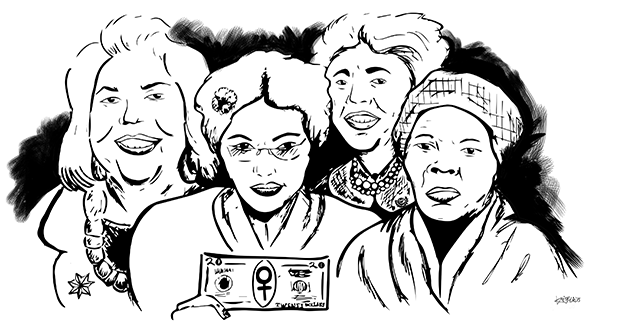Editorial: Women on 20s
Women on 20s was formed under the premise of petitioning President Obama to replace Andrew Jackson’s portrait on the $20 bill with that of a woman. The general public is now encouraged to vote from four final candidates for an ultimate winner to appear on currency.
April 10, 2015
Women have gained much from the women’s liberation movement.
Look around — women have infiltrated many factions of society that were at one time reserved exclusively for males. It is normal to see women in voting booths, driving cars and becoming doctors, lawyers and professors.
But there is still one place in society that women are markedly absent.
That place is on our currency.
Enter Women on 20s, an organization founded with the purpose of convincing President Obama that our founding mothers deserve the same symbolic recognition that has traditionally only been given to our founding fathers.
They propose that the best way to do so is to place one prolific American woman on the $20 bill.
The organization initially compiled a ballot consisting of 15 influential American women that voters can nominate for the President’s consideration.
This ballot has now been whittled down to four influential American women — Chief Wilma Mankiller, Rosa Parks, Eleanor Roosevelt and Harriet Tubman.
This campaign is particularly timely, considering the fact that 2020 will mark the 100th anniversary of the passage of the 19th amendment, which first granted women the right to vote.
We believe that it is our duty to utilize this right to memorialize the American women who have fought to ascertain a greater America for all of its citizens.
The fight for gender equality is far from over, and although this memorialization addresses sexism on a surface level, it is far over-due that these four women are acknowledged as some of the pioneering founders of our country as it stands today.
Many people will likely question what Andrew Jackson did to be booted from his tenure on the $20 bill in response to this proposal.
The answer? A lot.
The organization’s website reminds us that Jackson was responsible for the Indian Removal Act of 1830, which displaced many Native Americans from their homes and forced them to walk the Trail of Tears to the West.
Four thousand of these 16,000 Native Americans died, while others starved and contracted diseases as a result of this obligatory migration.
These are not actions our country should commemorate and venerate, particularly when so many women’s radical, brave and selfless foundational movements go uncelebrated and forgotten.
As a campus composed predominantly of women and ideally, entirely of feminists, we urge the student body to participate in this election.
These four women span the course of American history, and it is unlikely that at least one of these founding mothers has not radically impacted the course of your life on an incredibly personal level.
What better way to say thank you than demanding the respect they deserve?
Votes can be cast online at http://www.womenon20s.org/vote2.









